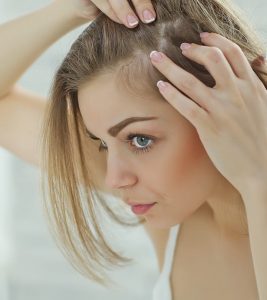
Hair fall is a natural process, especially for people with oily hair and scalps. But if the rate of hair fall increases significantly, it can be an alarming sign that something isn’t right with your hair. In this article, we will share insights on why the excess hair fall is worrisome and how you can prevent hair fall at home. Get reading to know more about why your hair is falling out and what you can do to tackle this issue once and for all. These tips on how to prevent hair fall will also help get your tresses back in order in no time.
What causes hair fall?
Hair fall occurs due to a number of reasons ranging from genetics to lifestyle factors like diet and stress. But let’s first understand what happens to your hair during a normal hair fall. Hair Fall – Hair fall is the natural process of shedding dead hair from your scalp. It is estimated that you lose almost 50 to 100 strands of hair per day. Hair fall is a completely normal process and is an essential part of the hair growth cycle. Hair Shedding – Shedding hair is a normal process of hair growth. New hair pushes out old and damaged hair from the follicles. Your scalp sheds about 10% of its total hair each year. While some hair shedding is normal, you should be concerned if you’re shedding more than usual. When you’re shedding hair, you might not notice it because new hair is growing in at the same time. The difference between normal shedding and excessive shedding is how long it takes for new hair to appear. If you’re shedding hair and it takes longer than three months for new hair to grow back, you could be experiencing excessive hair shedding. Its best to use a Hair Growth oil for stopping hair fall
What is the cause for excessive hair fall?
If you are having problems with excessive hair fall, then you should be concerned and take action as soon as possible. Whenever we talk about excessive hair fall, the most common cause is excessive oil production on the scalp that results in clogged pores and hair breakage. There are other causes of hair fall like – • Chemical-laden products – Using chemical-laden products can dry out your hair and lead to hair fall. • Weak or brittle hair – If your hair is weak or brittle, they are more prone to breakage than normal hair as they are not as strong. • Genetics – Some people are more likely to experience hair fall than others due to genetics. • Stress – When you’re stressed out, your body can produce excess levels of the hormone cortisol which can lead to hair fall as a side effect. • Hormonal changes – Hormonal changes can also trigger hair fall in some women. • Medical conditions – Diseases like thyroid disorders and alopecia areata can cause hair fall. • Medical treatments – Medications for some health conditions and cosmetic surgeries can cause hair fall as a side effect.
An In-Depth Look At Hair Fall
Hair fall is a normal biological process which is a part of the hair growth cycle and it happens due to various reasons. Hair fall is an important part of the natural growth cycle which lets old, dead hair come out to make way for shiny, new growth. The rate at which you shed hair is completely natural and it will vary from person to person. Generally, people shed 50 to 100 strands of hair daily, but it’s normal to lose more than this amount. Disruptions in the hair growth cycle can cause excessive hair fall and can also lead to hair thinning. There are many common reasons for hair fall apart from hair fall due to genetics. These can vary from excessive oil production on the scalp and clogged pores, weak or brittle hair, stress, medical conditions like thyroid disorders and alopecia areata, and medical treatments like medications for some health conditions and cosmetic surgeries.
Do’s and Don’ts to prevent excessive hair fall
You can follow these tips on how to prevent excessive hair fall to get your tresses back in order. – Avoid using too many hair products – If you use too many hair products, they can lead to build-up and clog your pores. This could cause your hair to fall out more as it struggles to break free. – Wash your hair less often – There is no need to wash your hair every day, especially if you have oily hair. Washing your hair too often can strip it of its natural oils, which can make your scalp produce more oil as a result. Try to wash your hair every other day to reduce the amount of hair that falls out. – Eat a healthy diet – A healthy diet rich in nutrients will help to keep your hair healthy and strong. Include lots of fruits, vegetables, and protein in your diet. – Manage your stress – Too much stress can lead to hair fall, so make sure to take some time out for yourself every day. – Get enough sleep – Your body regenerates itself while you sleep, so make sure you get enough sleep each night. – Avoid harsh chemical treatments – If you need to color your hair, avoid harsh chemical treatments like perming and straightening. Instead, choose gentler alternatives like semi-permanent dye or highlights and try to use Hair Serums for Hair care
Using natural shampoo and conditioner to prevent hair fall
If you’re experiencing excessive hair fall and you want to prevent it from getting worse, you should opt for a natural shampoo and conditioner. Natural shampoos and conditioners are gentler on your hair and scalp, which means they are less likely to cause damage or strip your hair of its essential oils. – Choose a shampoo and conditioner for oily hair – If you have oily hair, look for a shampoo and conditioner that is specifically designed for oily hair. These products will help to reduce oil production on your scalp. – Choose a shampoo and conditioner without harmful chemicals – Make sure your shampoo and conditioner are chemical-free. Choose an organic product, if you can. – Avoid regular shampoo and conditioner – Regular use of shampoo and conditioner can damage your hair and cause more hair fall. Try to use shampoo and conditioner once every two weeks.
Conclusion
Hair fall is a normal biological process and it happens due to various reasons. The most common reason is that the hair follicles are going through a resting phase, during which they will shed hair. If you notice a sudden increase in the amount of hair you’re shedding, this may be a signal that something is wrong. A health professional can help you determine if your hair fall is normal or if it could be a sign of something more serious. Follow these tips on how to prevent excessive hair fall to get your tresses back in order and make sure to speak to a doctor if you’re worried about excessive hair fall.
Article Submitted by Lakshmi Krishna Naturals
